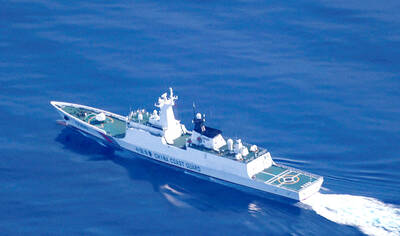Eyeing undersea riches including gold, cobalt and manganese, resource-poor Japan is planning a large-scale survey project to stake its claim to continental shelves before a UN deadline expires in six years.
The government is reportedly planning to spend more than ¥10 billion yen (US$85 million) on the first year of the project, a collaborative effort involving Japan's coast guard and the ministries of energy and science.
A plan adopted on Tuesday budgets ¥10.4 billion yen (US$88 billion) -- half to go to Japan's coast guard -- for the first year of the project and calls for finishing the survey and related research by 2007, the Yomiuri newspaper said.
Officials declined to confirm that figure yesterday, saying it had not been finalized.
But Japanese Prime Minister Junichiro Koizumi's administration had previously described the project as a national priority and announced its intention to scale up current survey activities.
Under the 1983 UN Convention on the Law of the Sea, a coastal state may claim rights to the resources of a continental shelf beyond its 370km exclusive economic zone provided there is geographical or geological continuity of the seabed.
For Japan to stake its claim, it must submit survey data for approval to the UN Commission on the Limits of the Continental Shelf by May 2009.
Preliminary surveys by Japan's coast guard indicate the island nation could claim some 650,000km2 of continental shelves -- an area about 1.7 times its territory, Land Minister Chikage Ogi told a recent news conference.
The area is believed to contain deposits of gold, silver, cobalt, magnesium and natural gas potentially worth trillions of yen (billions of dollars), Ogi said.
"If these claims are recognized, our dream of becoming a resource-rich nation will no longer be just a dream," she said.
Like other nations, Japan is keen on securing the mining rights as a potential future resource, said Masaaki Sasaki, an official with the National Resources and Energy Agency.
But he admitted that it's unclear when it will be technically or economically feasible to exploit those claims, some of which include areas more than 3km underwater.
"It's not something that can be exploited in the near future, and nobody knows for sure how much of what is down there," Sasaki said. "The ocean is a big place."
Two Japanese coast guard vessels have been surveying continental shelves around Japan for the last 20 years, covering a distance equivalent to 18 trips around the world.

LANDMARK CASE: ‘Every night we were dragged to US soldiers and sexually abused. Every week we were forced to undergo venereal disease tests,’ a victim said More than 100 South Korean women who were forced to work as prostitutes for US soldiers stationed in the country have filed a landmark lawsuit accusing Washington of abuse, their lawyers said yesterday. Historians and activists say tens of thousands of South Korean women worked for state-sanctioned brothels from the 1950s to 1980s, serving US troops stationed in country to protect the South from North Korea. In 2022, South Korea’s top court ruled that the government had illegally “established, managed and operated” such brothels for the US military, ordering it to pay about 120 plaintiffs compensation. Last week, 117 victims

‘HYANGDO’: A South Korean lawmaker said there was no credible evidence to support rumors that Kim Jong-un has a son with a disability or who is studying abroad South Korea’s spy agency yesterday said that North Korean leader Kim Jong-un’s daughter, Kim Ju-ae, who last week accompanied him on a high-profile visit to Beijing, is understood to be his recognized successor. The teenager drew global attention when she made her first official overseas trip with her father, as he met with Chinese President Xi Jinping (習近平) and Russian President Vladimir Putin. Analysts have long seen her as Kim’s likely successor, although some have suggested she has an older brother who is being secretly groomed as the next leader. The South Korean National Intelligence Service (NIS) “assesses that she [Kim Ju-ae]

In the week before his fatal shooting, right-wing US political activist Charlie Kirk cheered the boom of conservative young men in South Korea and warned about a “globalist menace” in Tokyo on his first speaking tour of Asia. Kirk, 31, who helped amplify US President Donald Trump’s agenda to young voters with often inflammatory rhetoric focused on issues such as gender and immigration, was shot in the neck on Wednesday at a speaking event at a Utah university. In Seoul on Friday last week, he spoke about how he “brought Trump to victory,” while addressing Build Up Korea 2025, a conservative conference

China has approved the creation of a national nature reserve at the disputed Scarborough Shoal (Huangyan Island, 黃岩島), claimed by Taiwan and the Philippines, the government said yesterday, as Beijing moves to reinforce its territorial claims in the contested region. A notice posted online by the Chinese State Council said that details about the area and size of the project would be released separately by the Chinese National Forestry and Grassland Administration. “The building of the Huangyan Island National Nature Reserve is an important guarantee for maintaining the diversity, stability and sustainability of the natural ecosystem of Huangyan Island,” the notice said. Scarborough